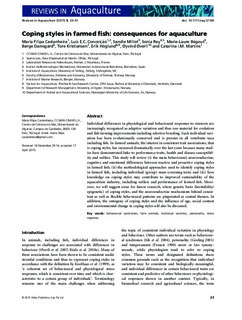| dc.description.abstract | Individual differences in physiological and behavioural responses to stressors are increasingly recognised as adaptive variation and thus raw material for evolution and fish farming improvements including selective breeding. Such individual variation has been evolutionarily conserved and is present in all vertebrate taxa including fish. In farmed animals, the interest in consistent trait associations, that is coping styles, has increased dramatically over the last years because many studies have demonstrated links to performance traits, health and disease susceptibility and welfare. This study will review (i) the main behavioural, neuroendocrine, cognitive and emotional differences between reactive and proactive coping styles in farmed fish; (ii) the methodological approaches used to identify coping styles in farmed fish, including individual (group) mass‐screening tests; and (iii) how knowledge on coping styles may contribute to improved sustainability of the aquaculture industry, including welfare and performance of farmed fish. Moreover, we will suggest areas for future research, where genetic basis (heritability/epigenetic) of coping styles, and the neuroendocrine mechanisms behind consistent as well as flexible behavioural patterns are pinpointed as central themes. In addition, the ontogeny of coping styles and the influence of age, social context and environmental change in coping styles will also be discussed. | nb_NO |
